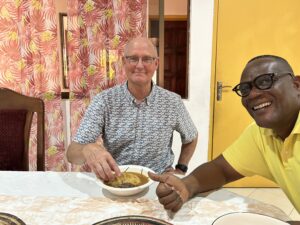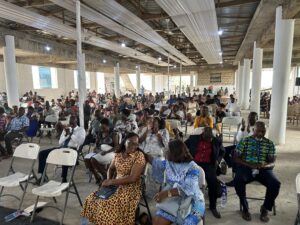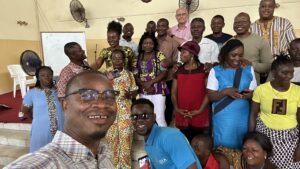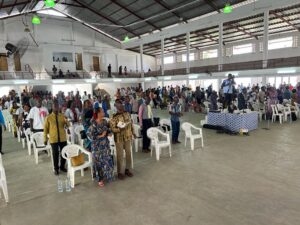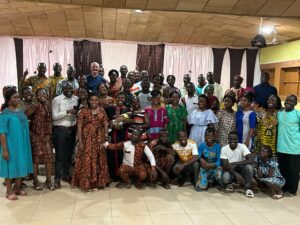Journal: Missionary Teaching Trip to Ghana, Liberia, Cote d’Ivoire and Senegal by Dr. John Oakes
Ghana, Liberia, Cote d’Ivoire and Senegal
I am now in Cote d’Ivoire, and will leave for Senegal tomorrow.
Accra, Ghana Feb 16-20
This is my second time in Accra, Ghana. My last visit was ten years ago. Ghana is a country of 32 million souls. It is a fairly small country, the size of Oregon, which means that the population density is quite high. Accra, the capitol, has a population of 2.6 million. Ghana is a relative success story in Africa. It was the first of a wave of countries to achieve independence in the late 1950s and early 1960s, and has had a generally stable and fairly democratic government, allowing for a growing economy. It is poor by Western standards, but does better than its neighbors. It is a mostly Christian country (73%) with a large Muslim minority (20%).
The church I am visiting is led by Francis and Paul Dasse. They moved here about four years ago from Abidjan, Ivory Coast, where they had been leading. This was a tough transition for the Dasse family because they only spoke French. All had to learn a new language, including their four children, as English is the common language in Ghana. Making it tougher, in early 2021, Francis had an extreme case of Covid-19. He went into a coma twice and his wife Paul, who was not allowed to see him, was told that he was dying—that she would see him in the mortuary. All prayed night and day and Francis made a miraculous recovery, although it took him six months to get back his strength. Perhaps equally miraculous is the fact that the Accra church planted a new church in Takoradi, Ghana in 2021.
Eating fufu with Francis Dasse
The church in Accra has 260 members, with about 400 in the country, including five churches in total. They have been slowed by Covid, for sure, but are continuing to preach the word here in Ghana. This is a VERY religious country—perhaps the most religious country I have visited, along with Nigeria. But the preaching is largely prosperity gospel, and tongues and other miracles are highly stressed here. Many question the depth of the spirituality of our sister church here in Ghana because they do not practice miraculous gifts.
I arrived Thursday, and spoke that night at their midweek service on how to have a deeper relationship with God specifically through their personal study of the Scriptures. Church was outside, as this was cooler. It is quite hot here all year round. The climate is tropical. Friday I teach for about four hours about the reliability of the Bible and other topics to the staff, followed by lunch of fufu. This is the basic staple food here. It is hard to describe, with a gelatinous consistency. It is made of pounded cassava root and plantain, with a spicy sauce. We heat it with our hands. Friday night is a class on Science and God for the campus group.
Saturday is a busy one. I travel to one of the church locations. The air pollution is very bad today, with visibility less than a mile. I give a two hour class on The Christian and Other Worldviews. The emphasis is on Islam, as this is a major religion here in Ghana. After lunch, we continue with a lesson of the Problem of Pain and Suffering. This, of course, is quite relevant here in Ghana, with both a recent ebola outbreak in neighboring countries, and with Covid-19. I get to spend time with the shepherds. The plan is to appoint elders in the very near future. This will be a great relief to Francis and Paul. Driving through Accra is quite an experience. The traffic is quite bad, but the drivers do obey the laws, which helps.
Church in Accra
Sunday is a very busy day. On the way to church I saw a large truck, loaded to overflowing with green bananas. That is not surprising in Ghana. The surprise is that a goat was sitting on top of the bananas, seemingly without a worry in the world. There are 400+ at church today, which is very encouraging, given that they have 260 members. This is a new building. In fact, it is still under construction. The service goes 3 hrs 58 minutes! I teach on Daniel, and then on Revelation, both in the same worship. The church here loves to worship together. The singing is so fun, with the brothers and sisters forming a dance line, and a lot of energy. You have to come to Africa to experience this. After this, I have dinner with the staff teachers and shepherds. What a wonderful send-off.
The church here seems to be doing quite well. They are looking for a young couple to come here to lead their campus ministry. Please consider moving to Accra to make disciples in this wonderful country. Tomorrow I am off for Monrovia, Liberia.
Monrovia, Liberia Feb 20-23
My flight to Monrovia was cancelled. By the grace of God, I was able to book on another airline and was not charged. On the drive to the city, I am struck by the extreme poverty in this country. Honestly, it is heart-wrenching—very different from Accra. The problems in Liberia stem from the devastating civil wars and terrible governments under “Seargent” Do and Charles Taylor throughout the 1990s and 2000s. To add insult to injury, they were the epicenter, along with Sierra Leone and Guinea, of the Ebola crisis. The government has been temporarily taken over by ECOWAS, the Western Africa coalition of countries. Perhaps then Liberia can begin to heal and its people achieve some sort of prosperity. My friends here tell me that the people are completely worn out with war and chaos.
Liberia is a fairly small country, with a population of almost six million. Monrovia has a population of a bit over a million. The country is not quite so religious as Ghana, but Christian churches are everywhere. Muslims make up around 30 percent of the population, but I see very little evidence of this in the capital. There is a special connection between Liberia and America because the country was begun by freed slaves from the US in the 1840s. It is the only country in Africa which was never colonized. They love Americans here.
On the way from the airport, we are stuck in complete gridlock, in which cars from all four directions at an intersection move into the lane of the oncoming traffic. This is not my first experience of this phenomenon, but it can be quite frustrating, as we sat for a very long time without moving. Thankfully, we arrived safe and sound at the place where I am staying after nearly three hours.
The church I am visiting is led by Oni and Ola Wale. They came here from Lagos a few years ago to help the church in Monrovia. The church has 260 members, with five other smaller churches in the other chief cities in Liberia. There are three regions in the church, and one of them is led by another full time couple, plus they have an intern, Timothy, who graduated from the school of ministry in Lagos. There is a great need for teaching here, as they have not had experienced teachers here at all up to this time.
I begin teaching on Tuesday. I am here for a leadership conference of all the churches here, so all the leadership couples from the five churches are here. I believe that none of them are paid, so they are taking time from work during the week to come and fellowship and to be taught. The hearts of the disciples here are so challenging to me. Tuesday I give seven hours of teaching on Science and God, Freedom in Christ, the Reliability of the Bible and on the Holy Spirit. There are so many questions, as the leaders are eager to learn. Wednesday is the same, with six hours of teaching on Evidence for Jesus, Hebrews and From Shadow to Reality. In the evening there is a midweek service with over 200 in attendance. Almost none of the members have cars, so coming to a midweek is no small commitment.
On Thursday I teach a class on Acts and Church history, hoping to inspire the faith of the leaders of the six churches here in Liberia, after which I am off to the airport to fly to Abidjan. My heart goes out to the disciples here. Please pray for the churches in Liberia.
Abidjan, Cote d’Ivoire Feb 24-26
Ivory Coast (Cote d’Ivoire) is a French-speaking country, with Liberia on the West and Ghana on the East. It is considerably more prosperous that Liberia. The most recent difficulties were the civil war which ended in 2011, so there has been a good amount of time to recover. I was last here in 2007 with my daughter Kate. Much has improved here. This is a country of 28 million, with 4.5 million in the capital city, Abidjan. Unlike Ghana and Liberia, which are predominantly Christian, Cote d’Ivoire is almost equally divided religiously. A recent survey discovered the country to be 42% Muslim and 39% Christian. Yet, there is remarkably little violence or even tension between Christians and Muslims here, which is very different from Nigeria.
The church here is quite large. It has around 2000 members. There are about ten other churches in our fellowship across the country. The largest is Diloa, which I am also visiting during this trip. My principle work here is to teach a 12-hour class on Church History for the leaders of all the Cote d’Ivoire churches, as well as the leadership group in the church in Abidjan. There are well over fifty students in this ministry training program. I am very impressed, both at the number who came, and at the maturity of the Christians here. They have three appointed teachers here, including Guy, Fulbert and Julien Toyo.
On Sunday I am honored to preach for two of the regions of the church here on Hebrews chapter 11. There are about 500 or so at this worship. The singing, of course, is great. They had three baptism as the service, as well as a dedication of a baby. This is a tradition in the churches in Africa in which the parents “dedicate” their children to God before the church. After church I have lunch with Guy and his daughters. He tells me about the church which was planted in Mauritania. They were so persecuted—not allowed to share their faith or even to worship in this Muslim country that, after two years, they came home. This will be a difficult mission field.
Daloa, Cote d’Ivoire Feb 27-March 1
On Monday I am driven six hours, about 240 miles, to the smaller city of Daloa. It is a regional center, supported largely by agriculture. We pass through the countryside which is composed of many hundreds of small villages and pastoral scenes including palm oil, rubber and banana plantations, cattle, coffee and, near Daloa, cacao. Cote d’Ivoire exports “cash” crops, and imports basic foods. The countryside is much less developed than Abidjan, of course, but the highways are surprisingly good. On the way we pass by an almost equal number of mosques and churches.
We pass through the political capital of the country, Yamoussoukro. This city began as a tiny village which was the home of the first president of Cote d’Ivoire. He made his home town into the capital and built a huge basilica there. We stop for lunch in Yamoussoukro, where I have some excellent local fish. We discuss the politics of France and Cote d’Ivoire. The locals resent the manipulation of France in their country, but also appreciate the help the French give. The relationship is complex. By coincidence, Emmanuel Macron, the premier of France will be in Africa tomorrow to discuss the relationship between France and its former colonies. All French African eyes are watching.
The church here has 145 members. They have not had an outside speaker for quite a while. It is a great pleasure to fellowship with and to teach for these spiritually hungry Christians. We are graciously hosted for dinner at the home of the church leaders Patrice and Elise Angama. In the evening I teach at a special meeting of the church on Evidence for Jesus. On short notice there are eighty here, which is encouraging. The best that I can tell, no one in the church speaks English. Fortunately, Jean Charles came along from Abidjan to do the translation. There is a baptism tonight.
Tuesday I teach a three-hour class on Daniel for the leaders of the Daloa Church, plus the leaders of two other churches in the West of Cote d’Ivoire. There is much interest in teaching here, and Patrice is training for the teaching ministry. In the evening, I teach on Daniel 11. It is impressive that the members came for church on Sunday, then both Monday and Tuesday evening. There is a good-sized campus ministry here. One of the campus students is baptized in the evening, after the lesson. The church here is growing here and appears to be strong.
Wednesday, I am driven back to Abidjan. We stop in Yamosoukrou, the capital, to visit the basilica. Our guide claims it is larger than St. Peter’s in Rome. It is a very impressive monument to the Roman Catholic faith in Cote d’Ivoire, having been built by its first president.
Dakar, Senegal March 2-5
Dakar is just over one thousand miles from Abidjan, mostly to the West, and just a bit to the North. Dakar is on westernmost point of land in Africa. The climate in Senegal varies from humid rainforest in the far south, to Savannah across most of the country, to the beginnings of the Sahara Desert to the North. Dakar is mostly hot, but it is also dry, as opposed to the intense humidity in Ghana, Cote d’Ivoire and Liberia. Dakar is cool due to the sea breezes. Dakar is the former capital of colonial French Africa. It is on a peninsula into the Atlantic, which makes the city quite crowded. It is also very busy. The traffic here is really bad. Metro Dakar has four million inhabitants. Senegal is a country of 18 million, 96% of whom are Muslims. Christians are a small minority here. Yet the Islam here seems mild. Only about half the adult women wear head coverings, and the men do not have long beards.
On Friday I 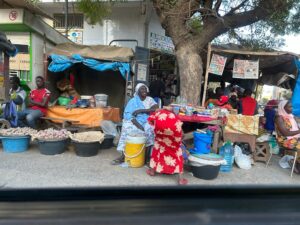 toured Goree Island with Jean Charles. This is the Portuguese, and later Dutch and British island from with 20 million slaves were exported from the 1500s to the early 1800s. This is a very sad place, but it also beautiful to visit. In the evening I am teaching for the church here on Answering Islam. This is obviously a very important topic here in Senegal, but it is also a sensitive topic, as it causes me to bring up some rather sharply negative things about Islam and even about Muhammad. I do my best to encourage the Christians here to point Muslims to Jesus, rather than to spread “dirt” about Muhammad or the Qur’an. There are 18 in attendance out of a church with 24 members. No visitors came, due to the sensitivity of the topic. This is a pretty good turnout for a Friday night.
toured Goree Island with Jean Charles. This is the Portuguese, and later Dutch and British island from with 20 million slaves were exported from the 1500s to the early 1800s. This is a very sad place, but it also beautiful to visit. In the evening I am teaching for the church here on Answering Islam. This is obviously a very important topic here in Senegal, but it is also a sensitive topic, as it causes me to bring up some rather sharply negative things about Islam and even about Muhammad. I do my best to encourage the Christians here to point Muslims to Jesus, rather than to spread “dirt” about Muhammad or the Qur’an. There are 18 in attendance out of a church with 24 members. No visitors came, due to the sensitivity of the topic. This is a pretty good turnout for a Friday night.
Saturday is a long one, with seven hours of teaching on Freedom in Christ and From Shadow to Reality. Perhaps two of those hours are spent in questions and answers, as the disciples here in Senegal are deep thinkers and really hungry for answers. The sessions are very stimulating. Again, about 18 come for a seen hour session. This is heroic to me! Only one member of the church speaks fluent English, which is Jean Charles. He is my translator. The leader is Hubert, along with his wife, but they speak almost no English, making it tough to have the deep conversations that I want to have. One difficulty here is that in Dakar, most of the baptisms have been students, but nearly all of the students in Dakar are here for their education, and leave back to their home country when they are through. This has made growth difficult, but they press on.
Sunday there are forty in attendance, which is really great for a church with 24 members. In attendance is Dennis who is the leader of our sister church in Gambia. This country is a tiny strip of land along the Gambia River inside of Senegal. It is an English-speaking country. He is returning from 6 months in Lagos. He was there for treatment of a serious lung infection that nearly took his life. I teach/preach on the problem of suffering. My interpreter Jean Charles has to leave for work, so they call a woman from another church on a moment’s notice, and she interprets my second class. With a break in-between, including my second class, church goes for 5+ hours. Then, I am off to the airport to return to the States. I am heading home, tired but feeling that the journey was well worth it, as there are so many needs in our sister churches in Western Africa
John Oakes
3/6/2023

